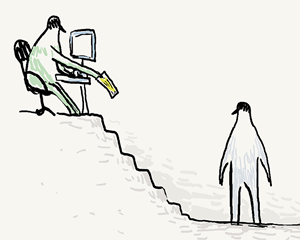Imagine that you've been unemployed and seeking work for months.
想象一下,你失业找工作已经好几个月了。
Government benefit programs have helped you cover rent, utilities, and food, but you're barely getting by.
政府福利项目帮你支付房租、水电费和食物费,但这只够你勉强糊口。
Finally, you hear back about a job application.
终于,你收到了一个申请工作的回复。
You receive your first paycheck in months, and things seem to be turning around. But there's a catch.
你收到了几个月来的第一份薪水,事情似乎正在好转。但有一个问题。
Your new job pays just enough to disqualify you from the benefit programs, and not enough to cover the same costs.
你新工作的薪水恰恰让你不符合领取福利津贴的资格,而不足以支付你的正常生活开销。
To make things worse, you have to pay for transportation to work, and childcare while you're at the office.
更糟糕的是,你必须支付上班的交通费,在办公室期间的托儿费。
Somehow, you have less money now than when you were unemployed.
不知怎的,你现在的钱比你失业时还要少。
Economists call this demoralizing situation the welfare trap -- one of the many different poverty traps affecting millions of people around the world.
经济学家称这种令人沮丧的情况为福利陷阱--影响世界各地数百万人的众多不同的贫困陷阱之一。
Poverty traps are economic and environmental circumstances that reinforce themselves, perpetuating poverty for generations.
贫困陷阱是自我强化的一种经济和环境状况,它使贫困世代延续。
Some poverty traps are tied to an individual's circumstances, like a lack of access to healthy food or education.
一些贫困陷阱与个人的情况有关,比如缺乏健康食品或教育。
Others can affect entire nations, such as cycles of corrupt government or climate change.
其他因素甚至可能影响整个国家,比如周而复始的腐败政府或气候变化。
But the cruel irony of welfare traps in particular is that they stem from the very policies designed to battle poverty.
但福利陷阱的残酷讽刺之处在于,它们源于与贫困作斗争的政策本身。
Most societies throughout history employed some strategies to help people in poverty meet basic needs.
历史上大多数社会都会采取一些手段来帮助贫困人口满足基本需求。
Before the 20th century, religious groups and private charities often led such initiatives.
在20世纪之前,宗教团体和私人慈善机构经常领导这类活动。
Today, these are called welfare programs, and they usually take the form of government-provided subsidies for housing, food, energy, and healthcare.
如今,这些被称为福利项目,通常采用政府提供住房、食品、能源和医疗补贴的形式。
Typically, these programs are means-tested, meaning that only people who fall below a certain income level are eligible for benefits.
通常,这些计划是经过经济状况调查的,这意味着只有低于特定收入水平的人才有资格获得福利。
This policy is designed to ensure aid goes to those who need it most.
这项政策旨在确保资源流向最需要的人。
But it also means people lose access as soon as they earn more than the qualification threshold,
但这也意味着,一旦人们的收入超过特定门槛,他们就失去了获得援助的资格,
regardless of whether or not they're financially stable enough to stay there.
不管他们的财务状况是否稳定。
This vicious cycle is harmful to both those in poverty and those outside of it.
这种恶性循环对贫困与不贫困的人都有害。
Mainstream economic models assume people are rational actors who weigh the cost and benefits of their options and choose the most advantageous path forward.
主流经济模型假设人们是理性的行动者,他们权衡自己选择的成本和收益,然后选择最有利的前进道路。

If those in poverty know they'll gain no net benefit from working, they're incentivized to remain in government assistance.
如果贫困人口知道他们不会从工作中获得任何净收益,他们就会有动力继续接受政府援助。
Of course, people work for many reasons, including societal norms and personal values.
当然,人们工作有很多原因,包括社会规范和个人价值观。
But income is a major incentive to pursuing employment.
但收入是追求就业的主要动机。
And when less people take on new jobs, the economy slows down, keeping people in poverty and potentially pushing people on the cusp of poverty over the edge.
当越来越少的人从事新的工作时,经济就会放缓,使人们陷入贫困,并有可能将人们推到贫困的边缘。
Some have suggested this feedback loop could be removed by eliminating government assistance programs altogether.
一些人建议,完全取消政府援助计划可以消除这种反馈循环。
But most agree the solution is neither realistic nor humane.
但大多数人认为,这种解决方案既不现实也不人道。
So how can we redesign benefits in a way that doesn't penalize people for working?
那么我们如何重新设计福利,才能不惩罚工作的人呢?
Many countries have tried different ways to circumvent this problem.
许多国家尝试了不同的方法来规避这个问题。
Some allow people to continue receiving benefits for a given period after finding a job, while others phase out benefits gradually as income increases.
有些政府允许人们在找到工作后的一段时间内继续领取福利,另一些政府则随着收入的增加而逐渐取消福利。
These policies still remove some financial incentive to work, but the risk of a welfare trap is lower.
这些政策仍然移除了一些工作的经济鼓励,但陷入福利陷阱的风险较低。
Other governments provide benefits like education, childcare, or medical care equally across all their citizens.
其他政府为所有公民平等提供教育、儿童保育或医疗等福利。
One proposed solution takes this idea of universal benefits even further.
一个提议将这一福利普及的想法进一步推广。
A universal basic income would provide a fixed benefit to all members of society, regardless of wealth or employment status.
全民基本收入将为社会所有成员提供固定福利,无论其财富或就业状况如何。
This is the only known policy that could entirely remove welfare traps, since any earned wages would supplement the benefit rather than replace it.
这是唯一可以完全消除福利陷阱的已知政策,因为任何挣来的工资都会补充福利,而不是取代福利。
In fact, by creating a stable income floor below which no one can fall, basic income might prevent people from falling into poverty in the first place.
事实上,通过创造一个稳定的收入底线,可能会从一开始就防止人们陷入贫困。
Numerous economists and thinkers have championed this idea since the 18th century.
自18世纪以来,无数经济学家和思想家一直支持这一观点。
But for now, universal basic income remains largely hypothetical.
就目前而言,普遍基本收入在很大程度上仍然是假设性的。
Although it's been tried in some places on a limited scale,
虽然在一些地方进行了有限规模的试验,
these local experiments don't tell us much about how the policy would play out across an entire nation -- or a planet.
但这些地方的试验并没有告诉我们这项政策甚至在整个国家或全球的效果如何。
Whatever strategy governments pursue, solving the welfare trap requires respecting people's agency and autonomy.
无论政府采取何种战略,解决福利陷阱都需要尊重人民的代理权和自主权。
Only by empowering individuals to create long-term change in their lives and communities can we begin to break the cycle of poverty.
只有赋予个人权力,使其生活和社区发生长期变化,我们才能开始打破贫困的循环。


